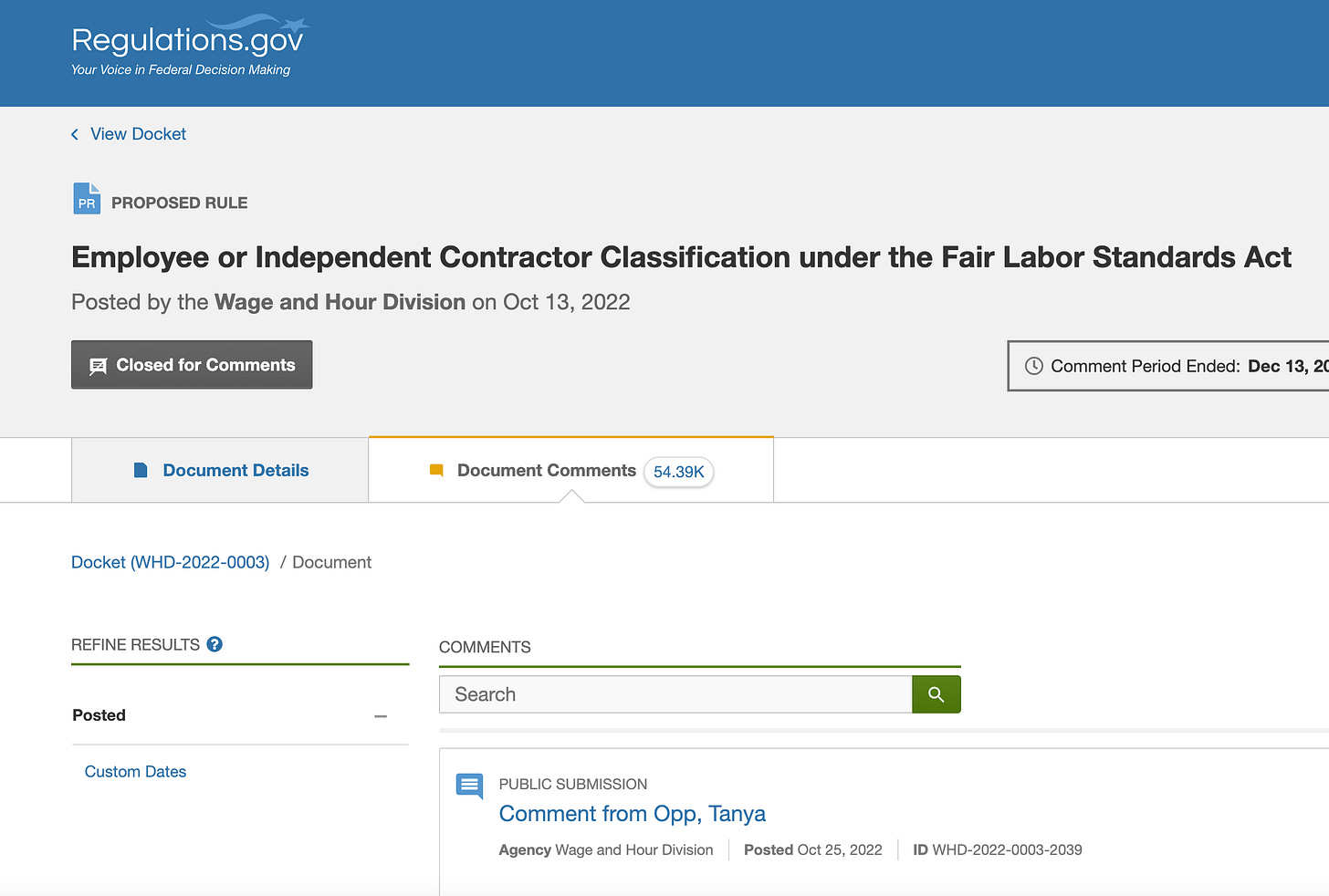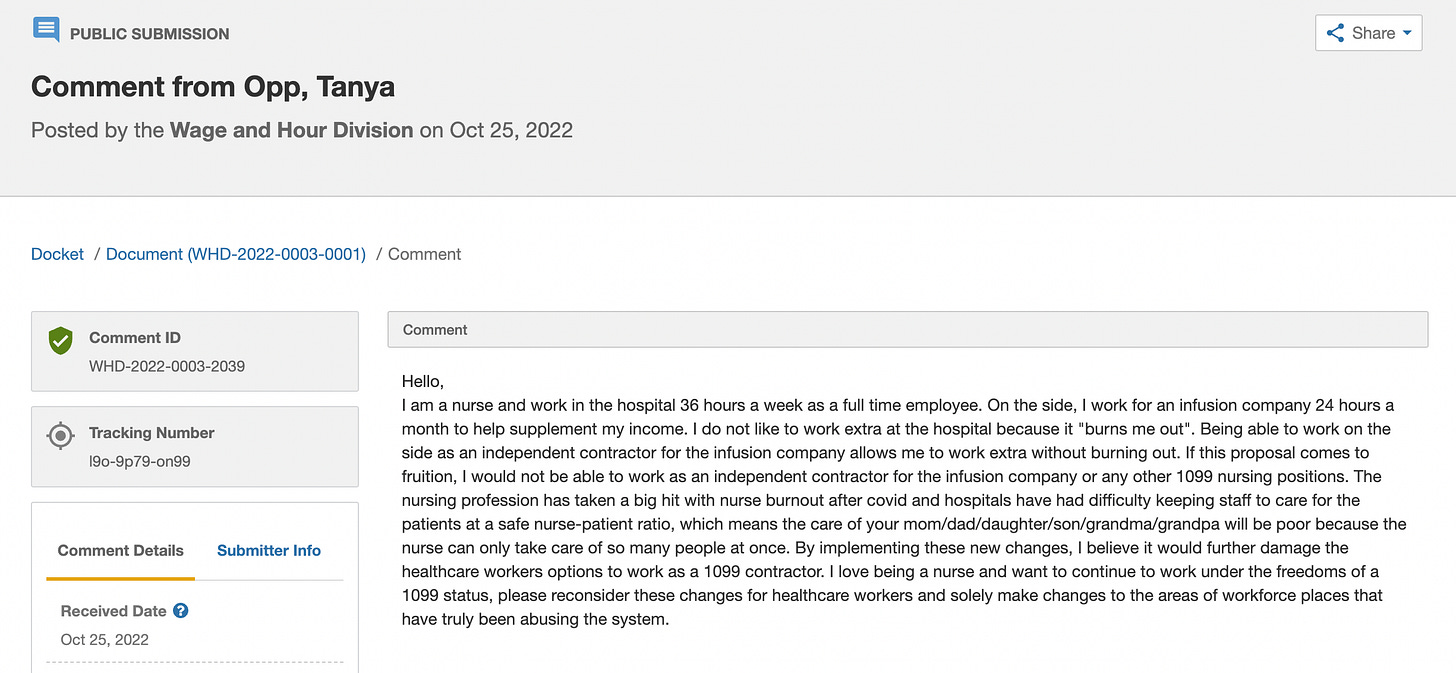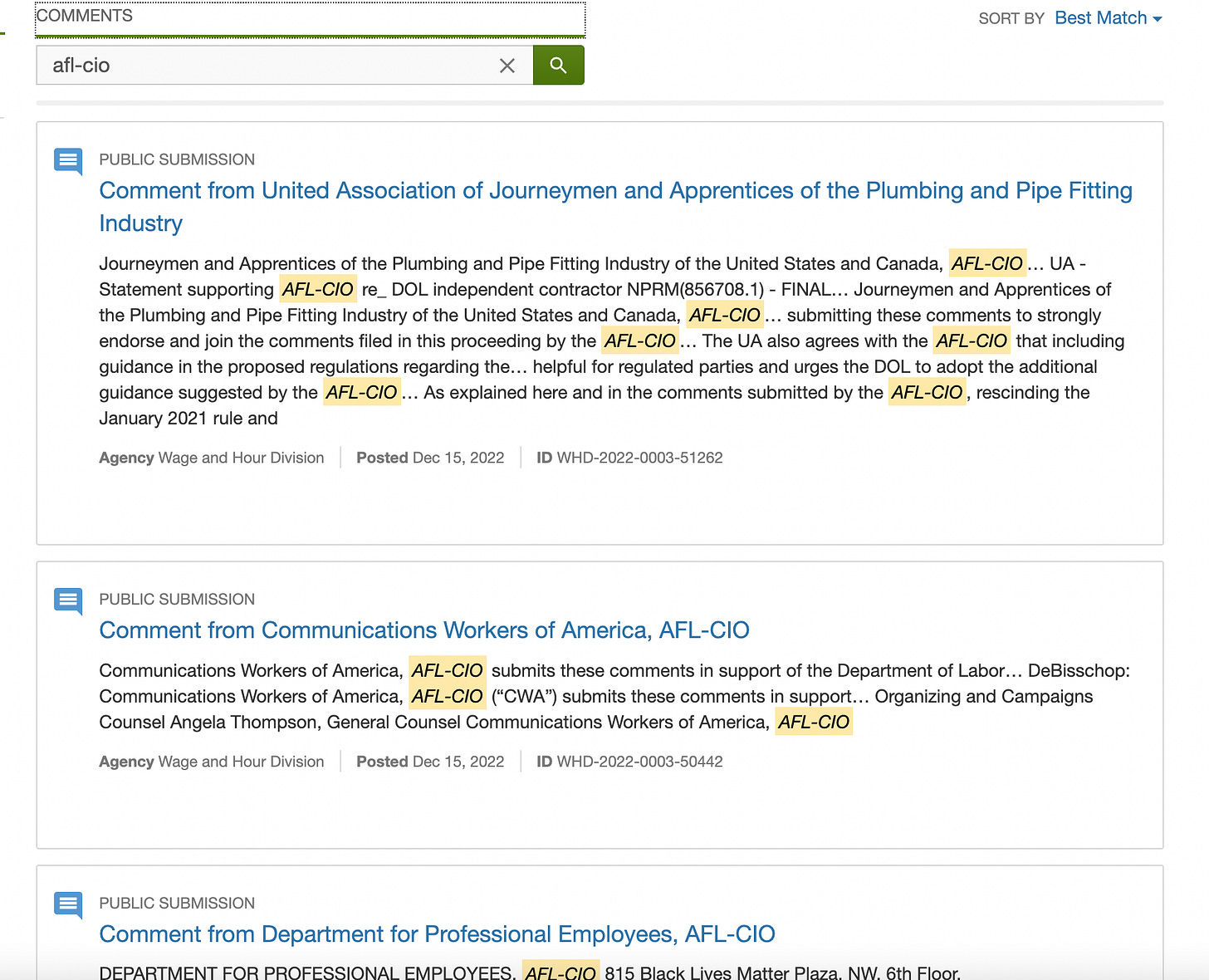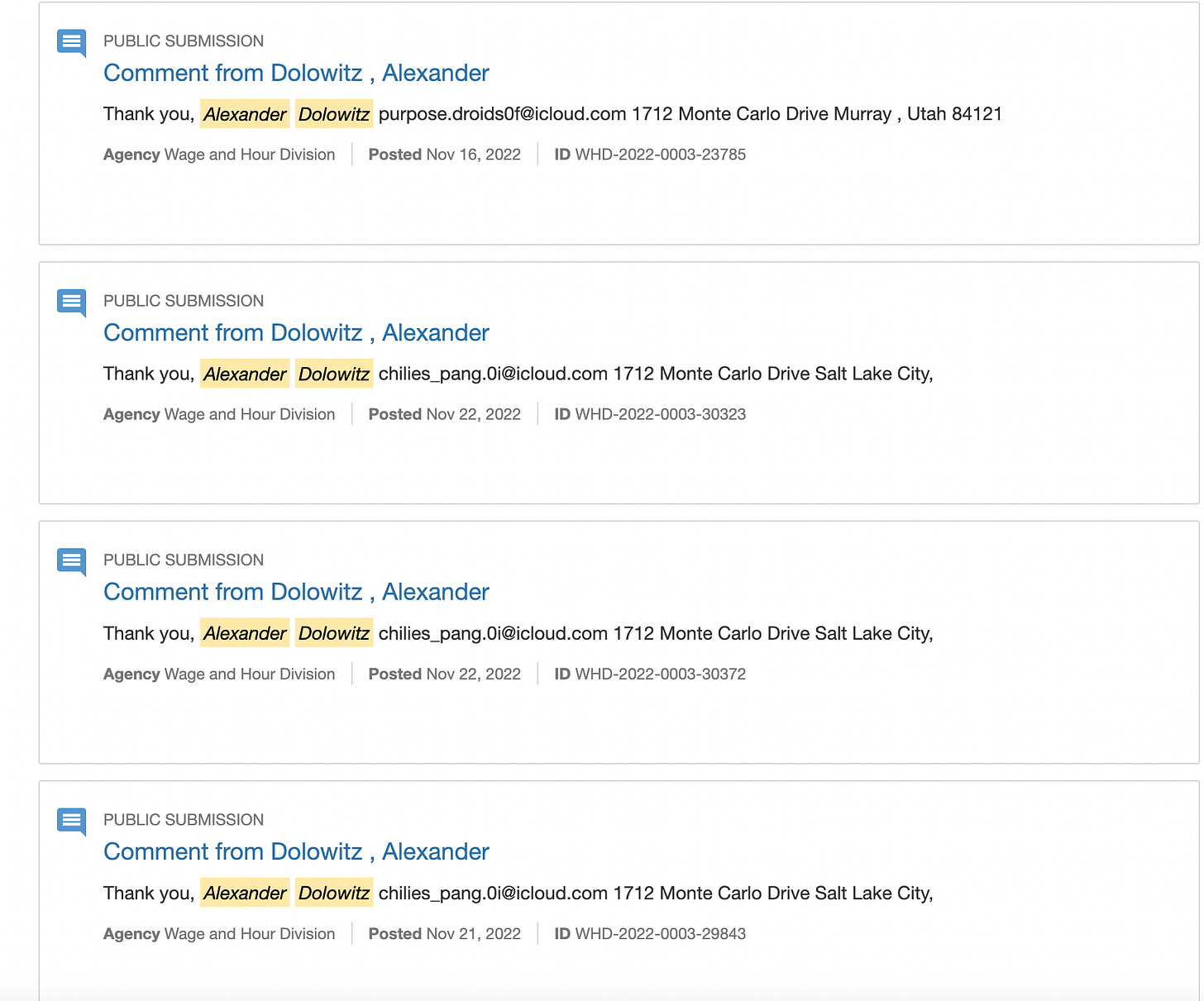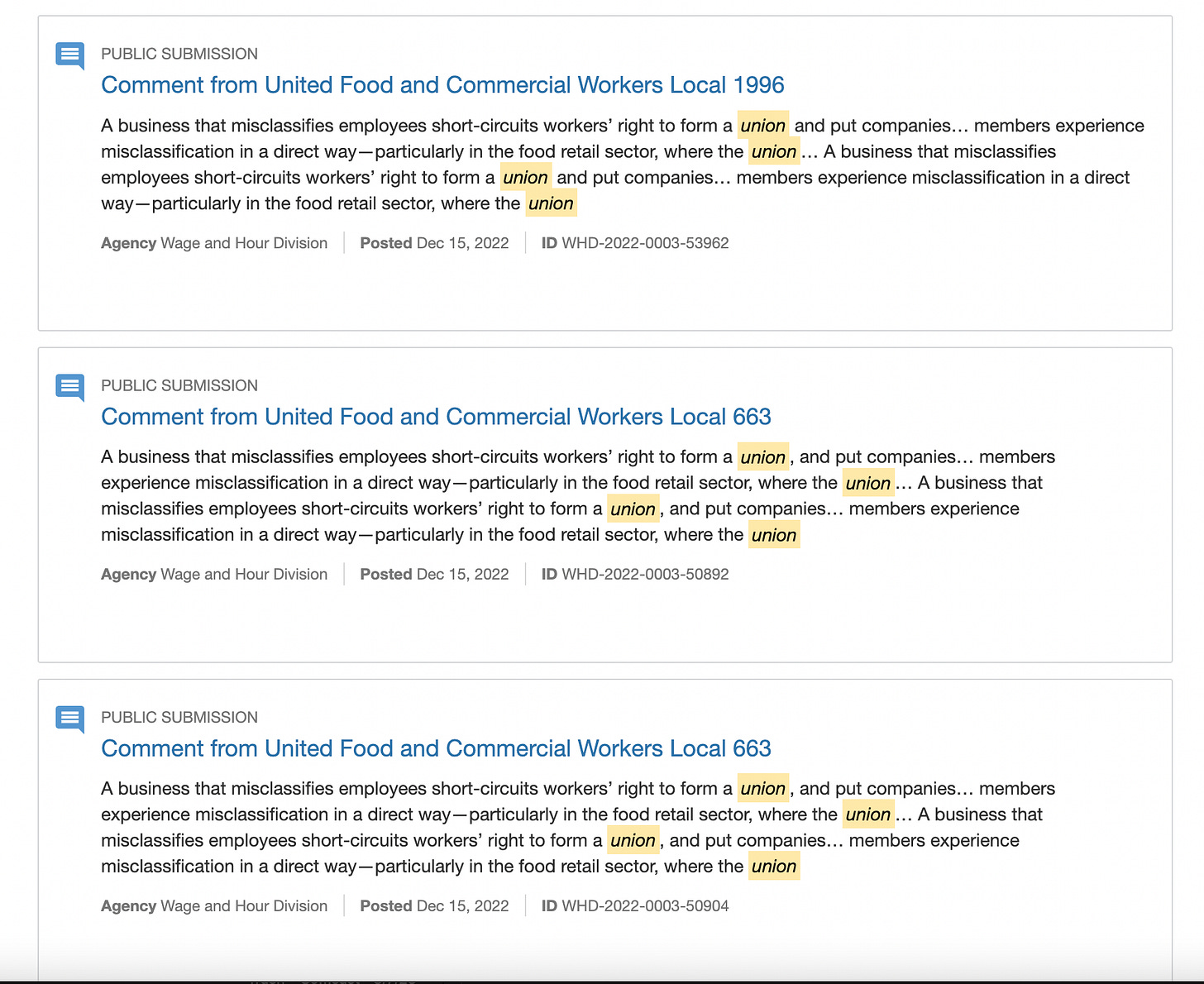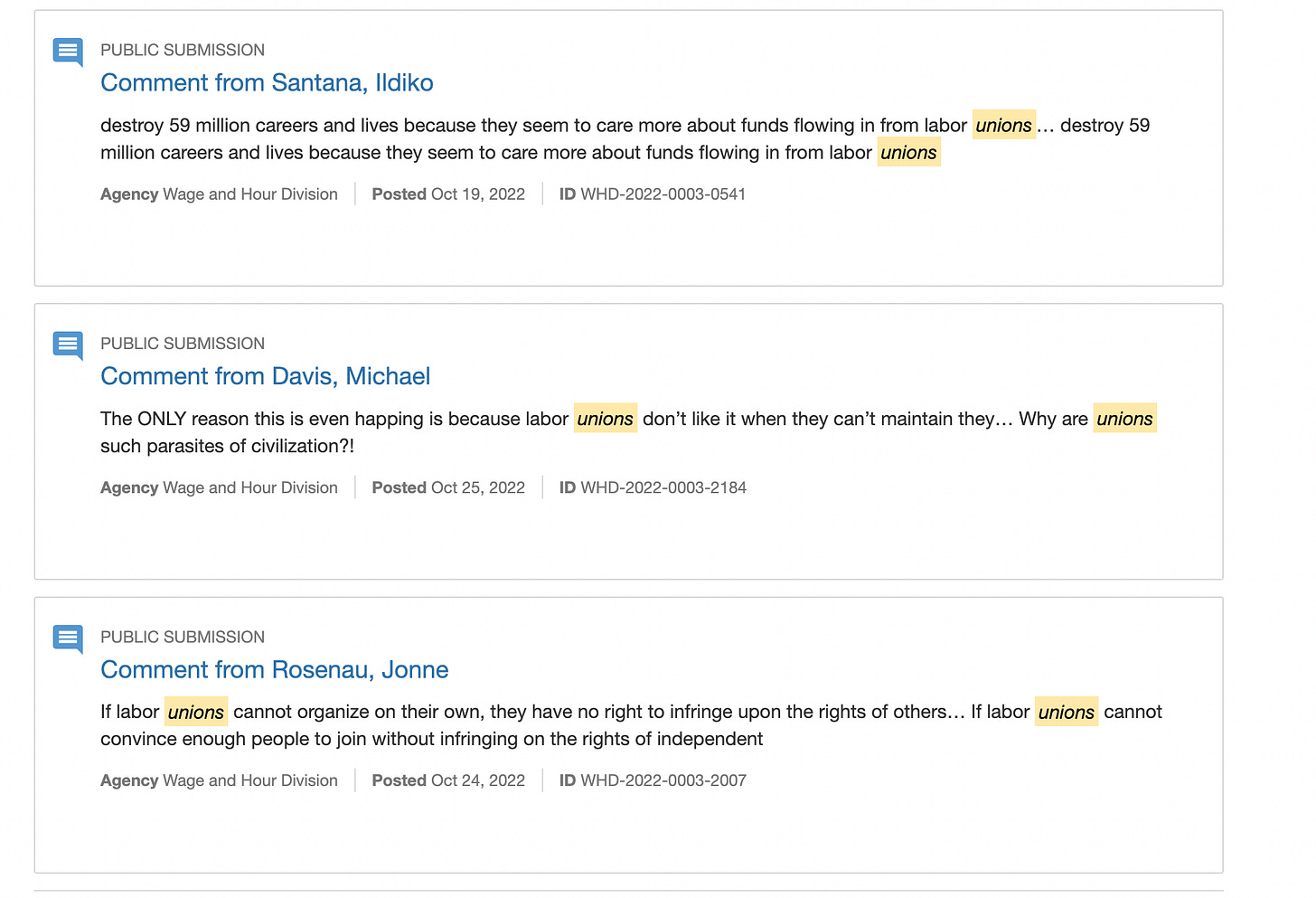Release The Comments
New Jersey's Labor Department says it will share all written comments about its independent-contractor proposal. Here's why we need them.
At June’s public hearing about New Jersey’s proposed independent-contractor rule, the people who testified demonstrated (yet again) that there are two sides in this policy debate:
union organizers and people affiliated with organizations that have strong union ties, who support this freelance busting;
everyone else, including all the independent contractors who stated a position on the proposed rule, and all the businesses and industry associations that would be affected, with all of us staunchly opposed.
The ratio of witnesses was 3-to-1 against the proposed rule at June’s public hearing, which was standing room only and went on for more than three hours. It was eerily similar to the public hearing at the New Jersey State House about a proposed freelance-busting bill in 2019, when the testimony went on for more than four hours with overwhelming opposition.
But here’s the thing: The public hearing in June was only for oral comments that people wanted to give the New Jersey Department of Labor & Workforce Development about its proposed independent-contractor rule. And each person’s testimony was limited to just four minutes.
There was also a process that went on through August 6 where people could file written public comments. These written comments could be much longer and far more in-depth.
That means the Labor Department is supposed to be considering a lot more than what people said at the public hearing. It’s also supposed to be considering all those written comments.
But we don’t know how many written comments there are, or who wrote most of them, or what most of them they say. The vast majority of these comments might as well be in a vault that only the Labor Department has been able to access for nearly a full month now.

Yes, some people have released their own written comments online:
this one and this one and this one and this one are from attorneys trying to protect independent contractors;
this one is from a top economist who included new research about how New Jersey’s independent-contractor policy is already causing harm;
this one is in defense of independent contractors from the New Jersey Chamber of Commerce, co-signed by 159 local and regional chambers including the African American Chamber of Commerce, the New Jersey State Women’s Chamber of Commerce, the New Jersey Pride Chamber of Commerce and the New Jersey State Veterans Chamber of Commerce;
this one is in defense of independent contractors, submitted by the New Jersey Business & Industry Association;
this one is written by yours truly on behalf of the nonpartisan coalition that I co-founded, Fight For Freelancers, detailing some of the questionable oral testimony we heard from our opponents at the public hearing in June;
this highly debatable one and this totally laughable one are from our opponents.
These public comments are a mere fraction of what exists, which we know because a member of Governor Phil Murphy’s staff told me last week that “multiple thousands of pages” of written comments were submitted.
And even though New Jersey’s Labor Department is not required to release all the public comments without us filing open-records requests and paying fees, a department representative told me last week that all the comments would be online for us to read for free “very shortly.”
That transparency should have happened months ago.
It’s important that we all get eyes on these written comments while there’s enough time to comb through every single word of them, before the department makes any final decisions.
Why? Because similar rule-making at the federal level—where there actually was a way to see the public comments—revealed all kinds of questionable claims and attempts to game the system against independent contractors.
How This Worked in Washington
Much as the New Jersey Labor Department is doing right now, the U.S. Department of Labor decided to make a rule about independent contractors a few years ago, during the Biden-Harris administration. (I’m a plaintiff in a federal lawsuit against that rule, which the Trump-Vance administration is now reconsidering and no longer enforcing.)
When it came to written comments about the independent-contractor rule at the federal level, we’d submit one, and then it would show up here in a database of all the comments received. Everyone could access this database. As new comments were filed, the database grew in real time.
At the top of this database was a running tally of how many comments were received overall. In that case, it ended up being more than 54,000:
Where it says “Comment from Opp, Tanya,” we could click on the comment that was filed by a person named Tanya Opp and read it in full, no matter how many pages it was. Longer public comments could be downloaded.
Tanya Opp’s comment happens to be short. Here it is, as an example:
To this day, anyone can see all of the more than 54,000 public comments that the federal government received, and get downloadable PDFs of the ones that are multiple pages long.
And we can search by keyword to see if any individual or organization tried to stack the deck in an attempt to influence the policymaking process:
We can also search for names or phrases, which is how I was able to figure out that somebody calling himself Alexander Dolowitz filed 44 public comments against us.
The dubitable Mr. Dolowitz sometimes said he lived in Salt Lake City, Utah, or Murray, Utah. And his email address sometimes changed from comment to comment:
The grassroots coalition I co-founded, Fight for Freelancers, detailed in our federal public comment (which you can download from the database here) how a spambot attack was launched against the entire filing process. We knew this happened because I was watching the newest public comments come online every day, and all of the sudden, there was a surge of comments filed against independent contractors:
“Prior to October 25, 2022, there were more than 2,100 public comments filed, the vast majority stating that they opposed the proposed rule change. This overwhelming opposition matched the ratio of people who spoke during the U.S. Department of Labor’s public hearings in summer 2022. These public comments filed through October 25 appeared to be from real people, either written in original language or with people’s names and affiliations stated at the beginning, including numerous members of easily verifiable professional organizations such as the National Court Reporters Association.
“Then, on October 26, a ‘comment bomb’ began to attack the public-comment system. The number of public comments jumped from about 2,100 to more than 4,200 by 9 p.m. According to Regulations.gov, as of 9:40 p.m. Eastern on October 26, more than 2,009 public comments had been filed that day, after about 2,100 comments had been filed during the entire rest of the comment period of nearly two weeks.
“These new comments were almost all the same copied-and-pasted form letter with signatures that included names, street addresses and emails. An online search of this personal information revealed that many of these names and email addresses have appeared for years in bulk lists at the bottom of petitions; on federal, state and local policy public comments; and on similar efforts on behalf of environmentalists regarding issues such as nuclear reactors, refineries, public utilities regulations in multiple states, and the like. Some of the email addresses had been used to sign previous documents in relation to a name that is different from the name on the U.S. Department of Labor public comment. In some cases, names and email addresses of commenters, when searched online, indicated that the people lived in states other than the ones listed in the U.S. Department of Labor public comments. Some of the public comments were signed by individuals who lived outside the United States.
“This ‘comment bomb’ attack continued to hijack the public-comment process well after October 26 and into December 2022, despite numerous members of our group publicly and repeatedly alerting the department about the problem, including posting screen shots of some of these clearly falsified ‘comment bomb’ submissions and tagging the department on Twitter. We documented as many as 10 of these form-letter comments filed by the same individual. One of these comments, filed November 21, was signed, “RE EWE, test@test.com, 3224 TEST, TESTCITY, District of Columbia, 20564.”
That’s the kind of stuff you can spot and quantify when a public-comment process is fully transparent in real time in a searchable database.
You can also see—by typing a word like “union” into the search bar—how many unions filed public comments, as well as how many locals of the same union filed multiple comments, and whether the various locals of the same union just copied and pasted the same language:
That same search for the word “union” will also bring up all the public comments that independent contractors filed calling out the unions for pushing this kind of deeply misguided freelance-busting policy:
Again, the people who testified at New Jersey’s public hearing in support of the proposed rule were either employed by unions, or affiliated with organizations that have strong union ties (see the list of those individuals on page five of the Fight For Freelancers public comment that was just filed in New Jersey).
I suspect that we’re going to see some similar patterns in the written comments here in the Garden State, too. If only we can get a look at them.
New Jersey’s Labor Department needs to release the written comments. Now.


